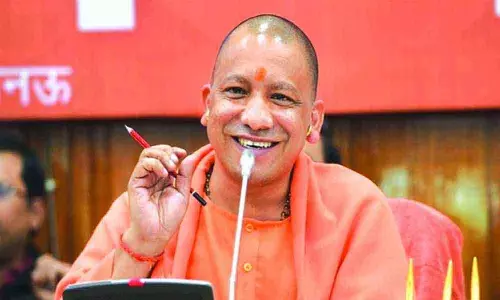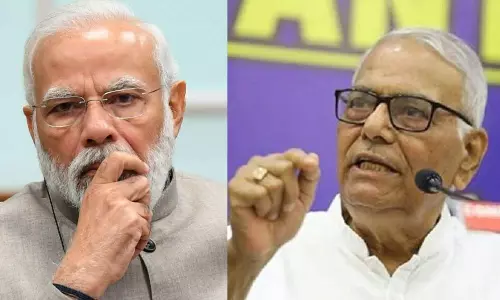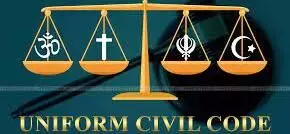
The Uniform Civil Code of an autocracy
text_fieldsIn Uttarakhand, the Pushkar Singh Dhami-led BJP government passed a Uniform Civil Code with calls of Jai Shri Ram, and thus the last of the Sangh Parivar forces' three-pronged plans has been fulfilled albeit partly. The Hindutva, which sped the racialization of state laws and codes by transforming democracy into majoritarianism, has used the Uniform Civil Code to accomplish this. As a result, the concerns that have been raised since the birth of the Indian Republic about the danger of this impractical and redundant concept are becoming apparent. It is no coincidence that when the concept of a Uniform Civil Code, which many saw as a symbol of secular democracy and freedom, was first adopted in the country, all of its inherent flaws were exposed. Wise voices have always said that the strength and beauty of India lies in the provision for each group to maintain its identity and stand as a nation in a country where religion and culture, secularists and non-religious people live in harmony. The shackles of colonial slavery were broken by anchoring the diversity of multiculturalism to the unity of India and moving India forward unbroken despite any weaknesses. Realizing this reality, the statesmen during the drafting of the Constitution included a Uniform Civil Code in their wish list under Article 44.
The Constituent Assembly headed by Dr BR Ambedkar included it in the Directive Principles because it was convinced in the long debate that it would encroach on the personal rights of religious and non-religious people. The records of the discussions at that time show that they foresaw that the law not only follows the law but also deviates from the will of those who use it. It was mostly religious people who raised concerns during the Uniform Civil Code debate in the Constituent Assembly. On the other hand, the non-religious/secular liberals had opposing arguments. Finally, all those who represented different places, dress, languages, religions and cultures came together and took the decision that India should be allowed to existing as belonging to all and made it a Republic. The Uniform Civil Code passed by the Uttarakhand government today has validated the earlier concerns. When the Uniform Civil Code came into being, the concerns raised by religious people, especially Muslims, became those of the proponents of the Uniform Civil Code. In a pluralistic society, it is necessary for the government to create a legal system in accordance with the diversity of their beliefs and customs in matters of personal life such as marriage and divorce. That is why even the British colonialists who advanced by conquering different countries allowed the different communities in India to follow their personal laws. Another example is when the Portuguese implemented the Civil Code in Goa, partially excluding the Hindu community. Aside from that, the Uttarakhand Civil Code itself demonstrates that if individuals are forced to fit into the mould of a single code known as a Uniform Civil Code that will be a visible projection. Adivasis, who constitute only three per cent of the state, have been exempted from the new law. This is according to Article 21 of the Constitution which stipulates the right to life and personal liberty. There is no legitimate answer as to why some people are excluded from this section which applies to all citizens of the country.
The new Civil Code's requirement to register marriages and live-in relationship, along with the provisions stated above, renders irrelevant Articles 25 and 26 of the Constitution, which provide freedom to believe, practice and propagate one's religion. There has been widespread protest against this invasion into personal privacy. In the same way, where religion is seen as a private observance of the individual, the new civil law has trampled on those beliefs and encroached into Muslim life, prohibiting even the private custom of 'Iddah' of the divorced/ widowed. Marriage and inheritance form part of religious observance for Muslims. The new Civil Code which interferes with in it, however, makes allowance for the law of inheritance in the division of Hindu property. The diverse tribal groups were kept out of the new law for fear of their displeasure. The BJP fears that their disapproval will not be confined to Uttarakhand and will backfire in most of the northeastern states as well. As a result, it became evident that the much-touted Uniform Civil Code was little more than a ruse for keeping those whom the regime holds dear and for driving away those whom it shuns. The experiences of the different countries that have tried it reveal that a Uniform Civil Law that invades individuals' privacy has always resulted in a mechanism for authoritarian regimes which have forgotten about democracy, to exercise their dominance over citizens. The Uniform Civil Code passed by Uttarakhand tells loud and clear that it is for this reason that the introduction of uniform civil code has become the top item on the agenda of the Sangh Parivar in its drive to create a politics of caste-fueled hatred in India.



























